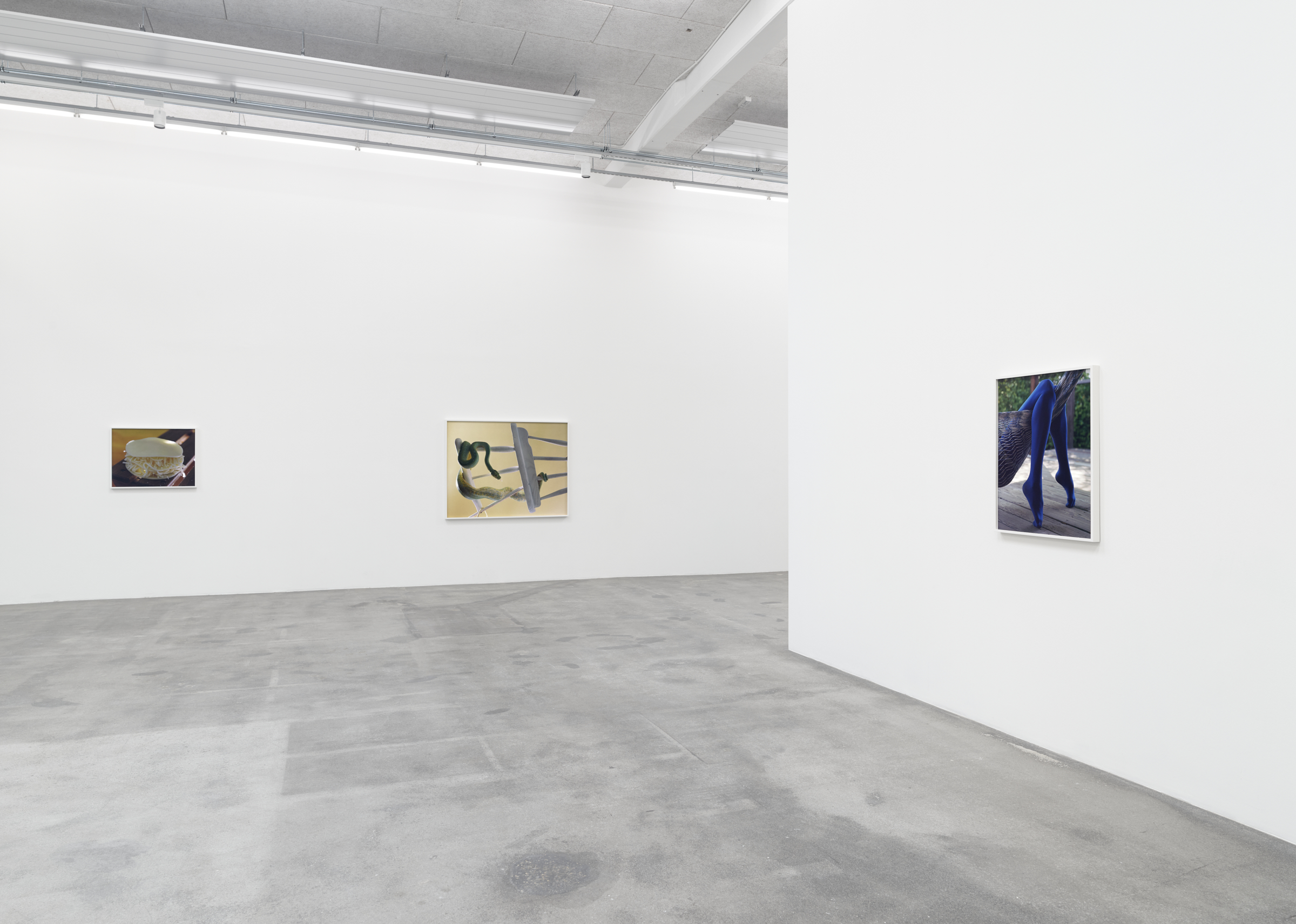TORBJØRN RØDLAND
SIMPLE GIFTS
09.11.23 – 22.12.23
NILS STÆRK is pleased to present Torbjørn Rødlands 6th solo-exhibition at the gallery: Simple Gifts.
Please find a link to the portfolio here
Think of tracing paper: when the lines on the tracing paper are aligned with the lines of the paper that has been traced, then the lines of the tracing paper disappear: you can simply see one set of lines. If lines are traces of other lines, then this alignment depends on straightening devices that keep things in line, in part by “holding” things in pace. Lines disappear through such processes of alignment, so that when one thing comes “out of line” with another thing, the “general effect,” is “wonky” or even “queer”.
Sara Ahmed, Queer Phenomenology, 2006
Legs adorned in vibrant blue tights gently sway in a hammock, suspended in states between relaxation and tension. Torbjørn Rødland’s Blue Hammock Legs captures the intersection of organic and inorganic elements. Toes curl, inviting reflection on the complexities of professed simplicity. The familiar becomes peculiar, disrupting the normative lines, offering a glimpse into queerness.
The word “queer” denotes an essence of oddness, strangeness or peculiarity. Surprisingly, though the topic of queerness is largely unexamined in the context of Torbjørn Rødland (b. 1970, Stavanger, Norway). Rødland may not himself identify as queer, yet the iconography of his photographs relates to queerness by challenging established normative categories. Something seems out of line, as opposed to the straight lines defined by British-Australian writer and activist Sara Ahmed. Rødland's photographs prompt us to question these lines to which we've grown accustomed, leading to moments of disorientation.
In her book Queer Phenomenology, Sara Ahmed delves into how society constructs lines, both metaphorically and physically, in order to define sexual orientation and guide individuals as they navigate their identities within normative categories. The normative straight lines result from repetition; from retracing the lines. The metaphor sheds light on how we use these given or constructed lines as directions to stay oriented, and how disruptions on the lines can lead to disorientation and provoke reflections on our identity and perception.
In this context, the term queer reaches beyond questions regarding sexuality and gender, serving as a broader term for what defies normative categories. It encapsulates something that cannot be rigidly defined, something that in essence is out of line.
As we delve further into the works presented in Simple Gifts, we encounter a captivating array of motifs, each with its own compelling narrative: A man's neck is threatened by a black baton held by the dainty yet resilient hands of a woman. A leg and foot in a high heel contort on a brick floor, evoking discomfort and intrigue. Cheese upon cheese forms an unconventional sandwich. A woman, with ice cream melting down her cheek, capturing an ephemeral moment. A man clings to legs dressed in latex, evoking desire and submission.
At first glance, the elements in Rødland’s photographs may appear familiar, much like the lines we've traced and retraced countless times. Yet, within each work, these familiarities are staged unconventionally, disrupting the lines that once guided us, challenging our sense of orientation. How can something in line seem so out of line?
As we retrace the straight lines, the privilege of orientation is taken for granted as something given. By disrupting the straight line, Rødland's photographs serve as a catalyst for deeper reflection and a reconsideration of our identity and our place in the world within the lines. His images capture the essence of queerness as they exist within the ambiguity between normative categories and the eluding definitions of them.
Torbjørn Rødland’s photographs do not offer quick readings; they invite us to explore the layered nature of each image, encouraging personal interpretations based on our own cultural, political and personal contexts as well as the lines we have retraced throughout our lives.
Simple Gifts serves as a reminder that in the complexity of life and identity, the most profound gifts are often found in the familiar or even the seemingly simplest of moments, where the already traced lines we follow are disrupted.
– Josefine Juliane Wiell Bisgaard Mikkelsen




